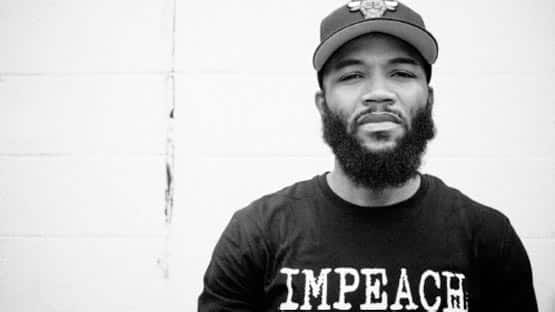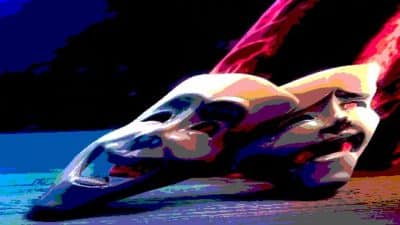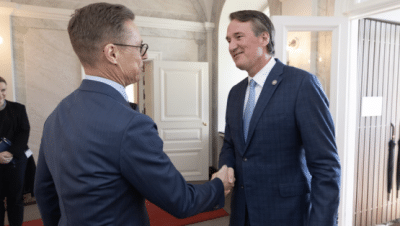
A.D. Carson is inspiring a new generation of musicians and artists of all ages through his music and words and redefining the notion that you need to be number one on the charts to be considered a success.
Carson, an Associate Professor of Hip Hop and the Global South at the University of Virginia, caught up with AFP after a Black History Month event at Walker Upper Elementary School in Charlottesville last week.
The school was celebrating African Americans in the arts, and Carson participated in the morning of activities.
“I think that our notions of what it means, especially to be a rapper, but what it means to be an entertainer, what it means to be an artist, can be dictated by the idea of popularity or failing,” Carson said. “What I wanted to talk to them (the students) about was the impact. It’s not only the amount of records or the amount of attention that you get online, sometimes it’s about the individual connections that you have with people or the kinds of things that you are teaching, and so impact can be measured in a lot of different ways.
“It’s not only what is number one on iTunes or Spotify charts, but it’s the kind of transformative experiences people might have one-on-one or in small groups, like the classes we were in today.”
Carson is an artist and teacher and considers himself fortunate to have the space to do both.
“There were times when I thought there would be a traditional performance route, but anytime that I tried to go away from teaching into performing full time or away from performing into teaching full time, it felt like an unscratched itch,” he said. “It was important for me to feel complete, I had to be doing both the teaching and the performing and the composing and the listening and all of those things.”
The professor of hip hop
It’s not surprising that Carson’s classes at UVA are popular among the student body. He teaches a class called “Writing Rap.” He said it is exactly what it sounds like; students are learning positional modes, the kind of raps that rappers make, how to listen to rap, what the conventions and expectations might be, and thinking about persona. He said he also teaches how to make audiences hear things you didn’t say outright.
“As much as I’m trying to teach people how to compose the music, we are relearning how to listen,” Carson said, trying to not just look at the words, but listen to the message the artist was attempting to convey.
He also leads a “Composing Mixtapes” class where the students write an album together and produce and release it as part of the course. He teaches a “Black Voice” class that focuses entirely on the histories of listening practices and how to understand race through sound. The rap lab is a space where students write and record their work in a professional recording studio.
“Lots of people listen to rap, and lot of people feel influenced by hip hop, but I don’t know that there are as many spaces where it’s folded into their professional trajectory,” Carson said. “I think it’s important to say that it’s not required that you become a rapper or that you become a musician to understand the rhetorical stakes that are at play whenever you’re listening to music, especially listening to music with people, but also thinking about the strategies that the artists are using to get people’s attention.”

Carson said people often dismiss the importance of hip hop as a career by saying things to him like … but you’re not just a rapper.
“I would say that I’m a rapper. I’m a rapper who teaches and who makes stuff that I hope people give a listen to. I think that I’ve accomplished my goal if I am just a rapper.
“I believe that the way we think about rappers, especially in the public imagination, really reduces the kind of important work that rap and rappers do especially given that it’s such a powerful tool.”
Success doesn’t require a degree
While Carson is fortunate to have credentials, he doesn’t want people to overlook up-and-coming artists and creators who don’t have degrees and don’t teach at universities.
He said he hopes “folks might go back and listen to those people, because those are the people that I’ve been listening to, that inspired me to keep pushing forward.
“There’s this rich history that exists from people who haven’t gotten degrees or haven’t been able to study officially. That also means that those young people, like at Upper Walker Elementary, those are the people we need to be tuning in to.”
Carson said he wants to make the path of the 14-, 15-, 16- and 17-year-olds who want to do this kind of work easier, and that, above all, is the most important work that can be done right now.
“I want to be able to uplift these people while they are becoming rather than on the other side because they made it,” Carson said.
“How do we make the path easier for them to take the route they want to take and make the kind of stuff they want to make and change the world in all of the ways we know the world will be changed with what they are doing?
“I think that we have to be really invested in the music and the culture and the people who are shaping that right now, because if we’re not, then those people, they will still be successful, but they’ll be successful despite us overlooking them rather than being successful because we supported them and made the path easier for them.”
As a child, Carson was lucky that he grew up in a household where music and creativity was a big part of his life through his parents and grandparents. Making art was the norm in his family – his grandfather was a musician; his dad played music; and his mother directed church choirs and wrote poetry. It was no surprise that he followed in their footsteps … first describing himself as a poet and later a rapper.
Contributing to the world with music
Carson said that he tells students they don’t need an external validator to tell them they are an artist. He said people need to encourage young people as they are becoming that they can be what whatever they want to be.
He believes it is important that people broaden their idea of what it means to make a contribution to the world.
“I don’t think that having a huge audience is what makes you as an artist. I think what makes you an artist is the impulse to create.”
Young people, he said, are dealing with complicated issues like race and politics, things that predate hip hop, in the music and the media that they listen to every day. The impact of music to tackle big issues is something that artists have been doing with lyrics for a long time.
“I believe that one of the ways it resonates, it’s often because it’s meeting people where they are and filling a need, when a person wants to hear a reality reflected back to them, not judging them,” Carson said. “It’s also saying, I’m here, and I understand your experience. That’s just one of the things that we have done, that we continue to do with music – to use it to reflect the realities that we might not talk about with other people.
“I think we can learn quite a bit from the way that hip hop artists … have been able to do that.”

- Carson’s forthcoming book, Being Dope: Hip-Hop & Theory through Mixtape Memoir, is under contract with Oxford University Press. No release date has been set.
- His most recent album, V: ILLICIT, and other projects are available to download from aydeethegreat.com










